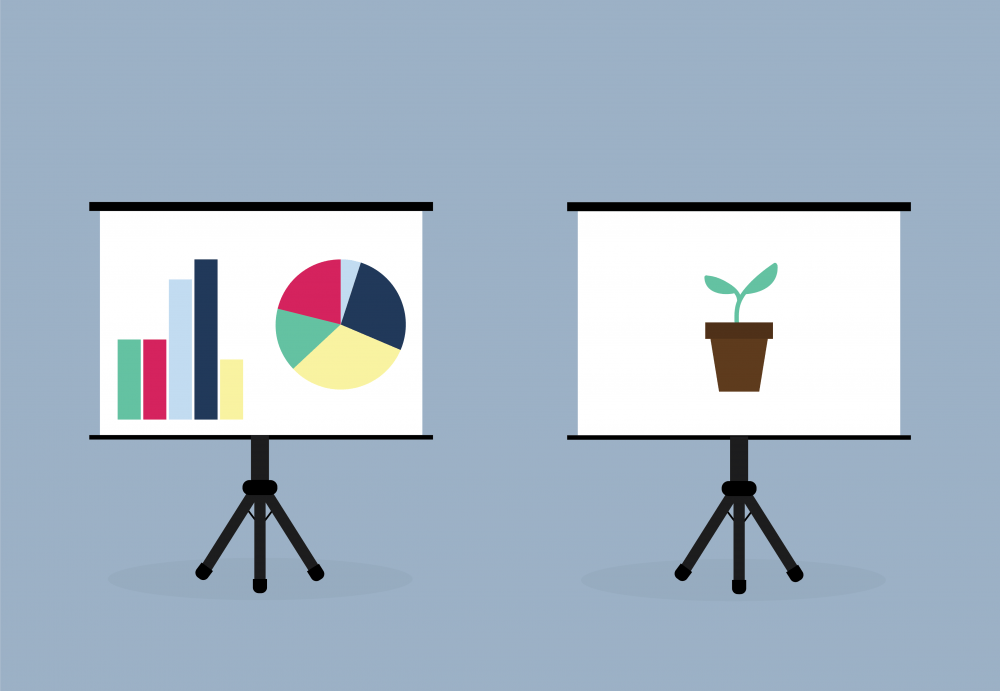Climate scientists recently predicted the planet will reach catastrophic temperatures because of global warming as early as 2030, if current trends continue. In response to data, sustainable practices aimed at protecting the environment are becoming more common in all facets of life.
Sustainability is defined by the United Nations as meeting the needs of the current generation without compromising future generations’ abilities to meet their needs. That involves balancing environmental, economic and social elements.
Many have already started finding ways to live sustainably within their own lives, minimizing their personal impact on the planet. Now, students in the Ohio University College of Business are learning to implement sustainability into their careers in the private industry too.
Colin Gabler, an associate professor of marketing in the College of Business, is aware of the environmental challenges the world faces and works to inform students of those challenges every day.
“Sustainability and the environment are issues that change daily,” Gabler said. “For instance, the policy under the Trump administration is much different than it was under the Obama administration, and so we discuss what that means for business, citizens and all stakeholders.”
Gabler teaches a course called Sustainability and Marketing, where students investigate the overlap between the two in a business context. The course focuses on current events that combine the environment with business. Gabler hopes to teach students that businesses have the opportunity to make changes to create a more sustainable future, but decisions can be difficult when they impact multiple stakeholders.
For instance, if a company invests in green technology, it benefits the planet, but could cost stakeholders more money. Gabler teaches the trade-offs between business and stakeholders, and how big businesses are one of the key institutions that shape the planet.
“The goal is to develop responsible, analytical, curious businesspeople who are ready to tackle the issues of our changing planet,” Gabler said. “You do not need to be in the College of Business to register, and I greatly encourage students from across the university to enroll.”
For the past four years, Gabler has had students from the class present in the Student Research and Creative Activity Expo. Gabler incorporates field studies, surveys, observational analysis, interviews, focus groups and many other methods to get students excited about the course material and their upcoming presentations.
This year, a student group in Gabler’s class presented an Earth Day marketing plan at the Student Expo. After conducting surveys to see what the event’s problems were and how to better market and promote it, the group worked to rebrand the event and increase awareness. The students redesigned the logo and the website, and created a Snapchat filter.
Brandon Kopitke, a freshman studying accounting and business pre-law, enjoys combining the business world with more sustainable practices.
“The business world needs to be more environmentally friendly,” Kopitke said. “We’re one of the biggest industries, and a great way to get people more excited about business is the appeal of being environmentally friendly. Plus, it’ll not only work on the business side, but greatly help the planet.”
Caitlin Banick, a freshman studying business, tries to help the environment in any way possible and thinks the business world could greatly use more sustainable practices.
“It’s important for the College of Business to teach sustainability because business is such a huge part of society, and I feel like if we learn it in college at a young age, then people will not only make changes in their daily lives to help the planet, but also take those lessons to their future jobs in the business field,” Banick said.
Gabler knows disastrous events like the Deepwater Horizon oil spill can also show the fragility of manmade technology and the repercussions of neglect and human error. However, he doesn’t know if tragedies like the Great Pacific Garbage Patch will make any business owners change their ways or make any consumers use less plastic.
“I think that is the challenge moving forward,” Gabler said. “Can we actually change our business and consumption strategy as a society and learn to live in this new paradigm we have helped create?”
Gabler always looks for ways to warn students and others about the environmental struggles the world faces. He knows people are relatively aware of what’s going on because it’s impossible to turn on the news or scroll through social media without being reading about new studies talking about rising sea levels, climate change, melting polar ice caps and a plethora of other problems. However, the next step relates to what people are going to do with that information, and he thinks his course in Sustainability and Marketing offers a great first step.
“The next step is to be proactive about it,” Gabler said. “To not just be aware, but informed so that when students hit the workforce, they are the ones developing creative and innovative solutions to help solve the environmental problems. The university requires so many things of our students to get their degrees, but we’re not going to be able to sit around and discuss Shakespeare, enjoy a Matisse painting or develop a marketing plan if we destroy the planet where all of these human activities take place.”






